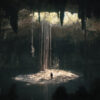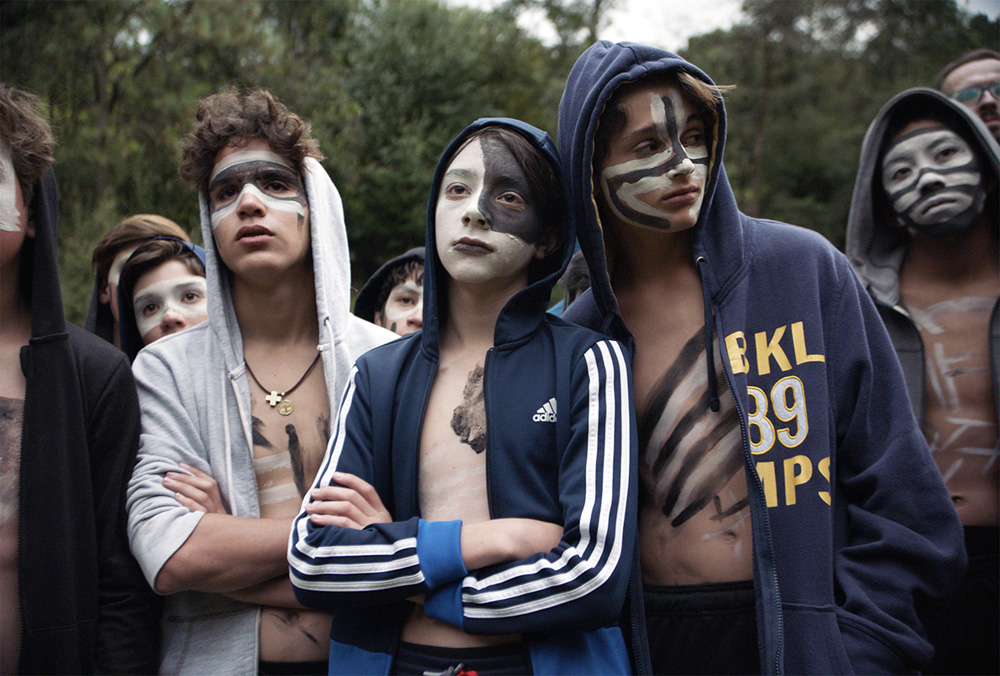There’s a glimpse of what the boys at Centro Escolar Los Pinos can become if they survive the summer in “The Hole in the Fence,” when the father of one of them has to pick up his son after he’s attacked by another. Descending onto the grounds of the Christian youth retreat by helicopter, he is treated with deference unseen by any of the kids during their stay by Mr. Monteros (Enrique Lascurain), the retreat’s impervious administrator, and addressed as “Minister,” you sense that having power now has been built on the idea he was toughened up at the retreat rather than ever seeing himself as one of the bullies who was predestined for success by class and now should enjoy it rather than question it, keeping his anger in check in spite of his son’s broken nose and content to chalk it up to boys being boys.
Those who can’t stand the sight of seeing children be cruel to one another might want to steer clear of Joaquin del Paso’s blistering allegory for the one percent that believes their fortune was bestowed by God, but it is bound to open eyes otherwise as the director paints a picture where something is deeply rotten underneath the surface at the religious camp. Mr. Monteros would have his collection of impressionable young minds believe that is the low-income community that lives just outside the grounds of Los Pinos, instructing them early that no one is to go beyond the gates when there have been “some incidents in recent months,” though when one of the boys wants him to specify, he declines. The boys do ultimately venture outside under his supervision, carrying with them gently used clothes as donations as a demonstration of their charity, and a young boy named Diego (Erick Walker), constrained by a neck brace and thought to be debilitated in other ways, was clearly approved for the camp as a goodwill gesture, though he’s only as interesting to the other campers or counselors as far as serving as an example of their benevolence.
Prayers are said often at Los Pinos, but Christianity is in short supply when the boys, left to their own devices, mercilessly taunt one another, swarming around those they think are weak, particularly Eduardo (Yubah Ortega), a young man whose darker skin stands out amongst the largely white Spanish group, and Joaquin (Lucciano Kurti), whose sympathy for Eduardo gets him branded as gay, that epithet of choice for those in the throes of puberty. There’s little in the example of the retreat’s professors to discourage such nasty attitudes, though their ugly behavior is often codified and delegated if need be to their underlings. Still, as good as they’ve become at grooming the boys to become men in their own image, the Los Pinos leadership has an issue when, as per the title, a hole opens up in their fence with no indication of how it happened, though some stray blood suggests a beast may be on the premises. The elders know better than to think it’s the half-goat/half-donkey that one of the boys imagines, but even when any physical threat is considered minimal, the idea that anyone starts thinking for themselves is dangerous.
As much thought as the powers that be have put into constructing a world inside Los Pinos that blinds the boys to the reality of what goes on outside, del Paso, with co-writer Lucy Pawlak, go one step even further in not only creating a credible environment for the gradually outrageous events that befall the boys, with remarkable performances from its young cast, but articulating the influence it has on them when casual acts of brutality and gaslighting begin to be subtly incorporated into their behavior. (It’s telling that Pawlak didn’t only imagine the world on the page, but quite literally built it as the film’s production designer.) Cinematographer Alfonso Herrera Salcedo sets a lacquered veneer where the clear blue skies and sunlight mask the super dark happenings of the narrative when it isn’t shot at a voyeuristic remove, reflecting the unflinching eye of the professors’ over the boys’ matriculation, and the film’s deeply unsettling climax, like much of the film, is the product of shrewd technical choices in sound design and shot composition rather than anything explicit. After all, evil is often abstract, but “The Hole in the Fence” exposes it brilliantly.
“The Hole in the Fence” opens on May 26th in Los Angeles at the Laemmle Glendale, June 2nd at the Zeitgeist Theatre in New Orleans and June 23rd in Columbus, Ohio at the Gateway Film Center. It will also be available on demand on Vimeo on May 26th.




